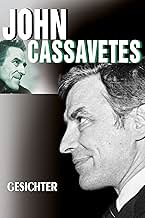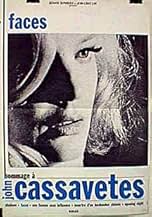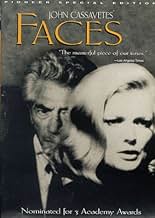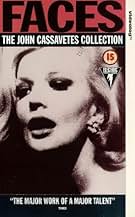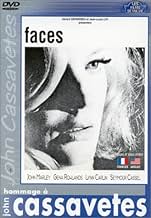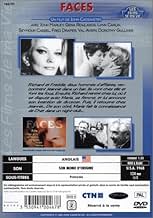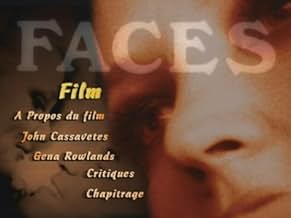AVALIAÇÃO DA IMDb
7,4/10
12 mil
SUA AVALIAÇÃO
Um homem de meia-idade deixa a sua esposa por outra mulher. Pouco tempo depois, a sua ex-mulher também começa uma relação com um casal mais jovem. Segue as suas lutas para encontrar amor uns... Ler tudoUm homem de meia-idade deixa a sua esposa por outra mulher. Pouco tempo depois, a sua ex-mulher também começa uma relação com um casal mais jovem. Segue as suas lutas para encontrar amor uns pelos outros.Um homem de meia-idade deixa a sua esposa por outra mulher. Pouco tempo depois, a sua ex-mulher também começa uma relação com um casal mais jovem. Segue as suas lutas para encontrar amor uns pelos outros.
- Indicado a 3 Oscars
- 5 vitórias e 9 indicações no total
George Dunn
- Comedian
- (as George Dunne)
Avaliações em destaque
I have only recently become acquainted with Cassavetes films and I am continually impressed. This film was made on a shoestring budget filming primarily at night because the actors had day jobs. The working title, I understand, was "Dinosaurs" which sums up things up nicely. This is an important film since it shows flawed human beings especially in a time that was truly in upheaval - the late `60's. But Cassavetes was already anticipating the attempt at overthrowing the status-quo. This is a hard but fascinating film to watch. The masks, the self-loathing, the fear, the confusion of intimacy, the now tired slogan of the war between the sexes with entertainment all driven by prescription pills, alcohol and cigarettes...it's all here. Is it "real" or is it "contrived"? Even a well acted scripted play still can penetrate us. The people and conversation "inane"? You bet. Go to work or a club and listen closely -- we live lives that should never be filmed. Cassavetes films as if he's eavesdropping. Lastly - I could not imagine this film or 'Shadows' in anything but b/w....even if he COULD have afforded color stock. Excellent film.
This film is one of the supreme masterworks of all of American cinema. It is absolutely essential. Yes, it is "difficult." Yes, it is "slow." But those standards are for enterainment. Cassavetes wants to take us out of our ordinary ways of viewing. He wants to deny us the escapism of "entertainment." That's the point. If you have trouble with this film--good! If you find it infuriating--good! If you find it not entertaining--good! It wants to get under your skin. It wants to shake you up.
It is a deep exploration of manhood in America, of the power games that men play with women, and of the other kinds of games women victimize themselves with. Deeper than Citizen Kane, more abrasive than Magnolia or American Beauty, Faces turns the camera on the ordinary, everyday ways men and women treat each other. It wants to get under your skin, and if you allow it to, without giving up or shutting your mind to it, it will profoundly enlighten you.
I also want to highly recommend a stunning book about Cassavetes that makes a nice companion piece to a viewing of the film. Ray Carney's Cassavetes on Cassavetes book (or his web site devoted to Cassavetes) has almost 100 pages about the making of this film. Both throw more light on how Cassavetes got the amazingly intimate and exposed performances he did.
But trust me, this film can change your life. It is one of the greatest works of art in all of film. And the resistance it meets with is proof of it
It is a deep exploration of manhood in America, of the power games that men play with women, and of the other kinds of games women victimize themselves with. Deeper than Citizen Kane, more abrasive than Magnolia or American Beauty, Faces turns the camera on the ordinary, everyday ways men and women treat each other. It wants to get under your skin, and if you allow it to, without giving up or shutting your mind to it, it will profoundly enlighten you.
I also want to highly recommend a stunning book about Cassavetes that makes a nice companion piece to a viewing of the film. Ray Carney's Cassavetes on Cassavetes book (or his web site devoted to Cassavetes) has almost 100 pages about the making of this film. Both throw more light on how Cassavetes got the amazingly intimate and exposed performances he did.
But trust me, this film can change your life. It is one of the greatest works of art in all of film. And the resistance it meets with is proof of it
I'm sorry. I can't quite say I LIKED this movie. But, if nothing else, I... appreciated it. NO ONE can accuse Cassavetes of being unoriginal in any aspect of the production. Every frame of the film is remarkably unconventional. And furthermore, the performances were so starkly real it makes the prospect that there even WAS a script seem impossible to me. Now, I don't know any back story about this movie, but I'm sure there had to have been some script involved somewhere. What I'm saying is that the way the actors played it, the lines seemed... unwriteable. It's as if we were watching a documentary, but one where we can be certain those involved didn't know they were being filmed.
Basically, except for the poor dubbing that makes literally MOST of the dialogue in the film incomprehensible, I can't say there's anything about any individual sequences in the film that I disliked. HOWEVER, what I did have a problem with is this: the vanguard style of filmmaking, the characters, the situations they are in, the dialogue (if you want to call it that): does it all really come together to SAY anything? I didn't come away with any kind of an interesting or coherent message from the film. Which is fine if the scenes flow nicely together, but they really don't. Each scene as an entity unto itself is wonderful, but their juxtaposition together gets especially tiresome. I mean, for roughly 80% of the film, ALL of the characters onscreen are inebriated. Now, this makes it extremely difficult to get to know the characters beyond their buffoonish drunken altar egoes. Maybe, that was the point. I don't know. What I do know is that Cassavetes stubbornly refuses to reveal to us anything that even approximately resembles, plot, forward motion, or even... any kind of... an event... a happening until the last twenty minutes of the film when some interesting stuff finally happens. And this definitely alienates most audiences. Do you want to know why this movie has such a high rating? Because the people that didn't like it left after twenty-forty minutes. I know in the theater that I saw it in (a student film organization that watches intellectually stimulating independent fare weekly with warm response), the crowd of twenty people had been reduced by the end of the film to me, the president of the club (who was reading), and one other guy (whom I have a suspicion, fell asleep during at least part of the film) in the theater. EVERYBODY else got frustrated. Draw your own conclusions.
Basically, except for the poor dubbing that makes literally MOST of the dialogue in the film incomprehensible, I can't say there's anything about any individual sequences in the film that I disliked. HOWEVER, what I did have a problem with is this: the vanguard style of filmmaking, the characters, the situations they are in, the dialogue (if you want to call it that): does it all really come together to SAY anything? I didn't come away with any kind of an interesting or coherent message from the film. Which is fine if the scenes flow nicely together, but they really don't. Each scene as an entity unto itself is wonderful, but their juxtaposition together gets especially tiresome. I mean, for roughly 80% of the film, ALL of the characters onscreen are inebriated. Now, this makes it extremely difficult to get to know the characters beyond their buffoonish drunken altar egoes. Maybe, that was the point. I don't know. What I do know is that Cassavetes stubbornly refuses to reveal to us anything that even approximately resembles, plot, forward motion, or even... any kind of... an event... a happening until the last twenty minutes of the film when some interesting stuff finally happens. And this definitely alienates most audiences. Do you want to know why this movie has such a high rating? Because the people that didn't like it left after twenty-forty minutes. I know in the theater that I saw it in (a student film organization that watches intellectually stimulating independent fare weekly with warm response), the crowd of twenty people had been reduced by the end of the film to me, the president of the club (who was reading), and one other guy (whom I have a suspicion, fell asleep during at least part of the film) in the theater. EVERYBODY else got frustrated. Draw your own conclusions.
So this is the work of John Cassavetes? Pretty good, I must say. I definitely can appreciate good conversations and witty dialogue any day.
This film, I would say is another one of those indie films (sort of foreign-filmmaking- esque) from how it is much ado about NOTHING. I love these films. They are like a breath of fresh air. That, and they always seem so personal. I wonder if it was actually scripted or if it was improvised like most Cassavetes projects.
The only work I have seen of Mr. John Cassavetes was his depute film, Shadows, which was mainly all improve, or so he says in his interviews. I take a strong liking to these films because of how slow they are, yet SO INVITING; so UN-American, if you will. - People have said that Cassavetes brought the indie film movement to the states. So far I have not been proved wrong so far. His films, such as Faces, are all so unique and timeless. Like literally, I believe this movie will be studied until THE END OF TIME.
I like seeing people celebrating. It is nice. Gives one the feeling of calmness; like nothing extreme is happening so we don't have to waste any time stressing about it. Does that make sense?
Our main protagonist, Richard Forst (played by John Marley), is a (so called) businessman who has an affair with a much younger woman. Little does he know that his wife has some plans of her own.. You can really tell what kind of man Robert is when he says:
"I'm just a mild success in a dull profession, and I want to start over again. And I've got a bad kidney!"
This just shows what kind of person he is as he says it to the younger girl, Jeannie (played by the beautiful Gene Rowlands).
I really like the acting and love the struggles and conflict that this husband and wife go through. Both are trying to find happiness in so many ways, but is only making it worse for themselves. .
-- Michael Mendez
This film, I would say is another one of those indie films (sort of foreign-filmmaking- esque) from how it is much ado about NOTHING. I love these films. They are like a breath of fresh air. That, and they always seem so personal. I wonder if it was actually scripted or if it was improvised like most Cassavetes projects.
The only work I have seen of Mr. John Cassavetes was his depute film, Shadows, which was mainly all improve, or so he says in his interviews. I take a strong liking to these films because of how slow they are, yet SO INVITING; so UN-American, if you will. - People have said that Cassavetes brought the indie film movement to the states. So far I have not been proved wrong so far. His films, such as Faces, are all so unique and timeless. Like literally, I believe this movie will be studied until THE END OF TIME.
I like seeing people celebrating. It is nice. Gives one the feeling of calmness; like nothing extreme is happening so we don't have to waste any time stressing about it. Does that make sense?
Our main protagonist, Richard Forst (played by John Marley), is a (so called) businessman who has an affair with a much younger woman. Little does he know that his wife has some plans of her own.. You can really tell what kind of man Robert is when he says:
"I'm just a mild success in a dull profession, and I want to start over again. And I've got a bad kidney!"
This just shows what kind of person he is as he says it to the younger girl, Jeannie (played by the beautiful Gene Rowlands).
I really like the acting and love the struggles and conflict that this husband and wife go through. Both are trying to find happiness in so many ways, but is only making it worse for themselves. .
-- Michael Mendez
An old married man leaves his wife for a younger woman. Shortly after, his ex-wife also begins a relationship with a younger partner. The film follows their struggles to find love amongst each other.
This was one of the most influential films of the 1960s, if you consider how it inspired Robert Altman and Woody Allen, as well as employing Steven Spielberg as a production assistant while he was still making short films and had not yet broken into feature films.
How well the film has aged is debatable. While its influence is clear, the film itself is not necessarily the most fun. Some have called it "meandering", and it is hard to believe that at one point Cassavetes had a six-hour cut (allegedly).
This was one of the most influential films of the 1960s, if you consider how it inspired Robert Altman and Woody Allen, as well as employing Steven Spielberg as a production assistant while he was still making short films and had not yet broken into feature films.
How well the film has aged is debatable. While its influence is clear, the film itself is not necessarily the most fun. Some have called it "meandering", and it is hard to believe that at one point Cassavetes had a six-hour cut (allegedly).
Você sabia?
- CuriosidadesWhile filming a part on Bob Hope Presents the Chrysler Theatre (1963), John Cassavetes saw Steven Spielberg lurking around the set, as he was then in the habit of doing. Cassavetes approached Spielberg and asked what he wanted to be. When Spielberg replied he wanted to be a director, Cassavetes allowed the young man to direct him for the day. He later invited Spielberg to work on this film with Spielberg serving as an uncredited production assistant on Faces (1968) for two weeks.
- Citações
Maria Forst: There's a Bergman film in the neighborhood.
Richard Forst: I don't feel like getting depressed tonight.
- ConexõesFeatured in Cinéastes de notre temps: John Cassavetes (1969)
- Trilhas sonorasLove Is All You Really Want
Written by Jack Ackerman
Principais escolhas
Faça login para avaliar e ver a lista de recomendações personalizadas
- How long is Faces?Fornecido pela Alexa
Detalhes
Bilheteria
- Orçamento
- US$ 275.000 (estimativa)
- Faturamento bruto mundial
- US$ 7.236
- Tempo de duração
- 2 h 10 min(130 min)
- Cor
- Mixagem de som
- Proporção
- 1.66 : 1
Contribua para esta página
Sugerir uma alteração ou adicionar conteúdo ausente


